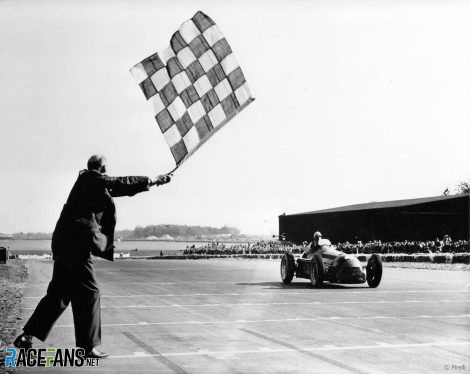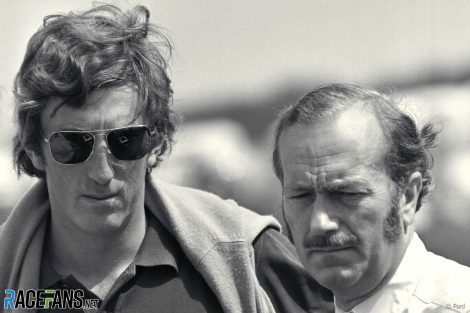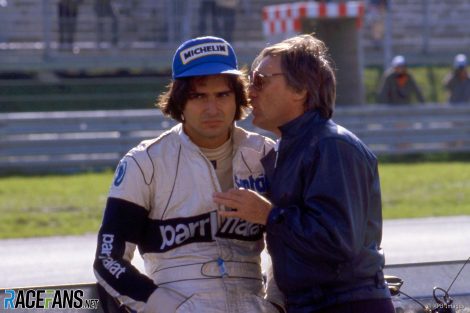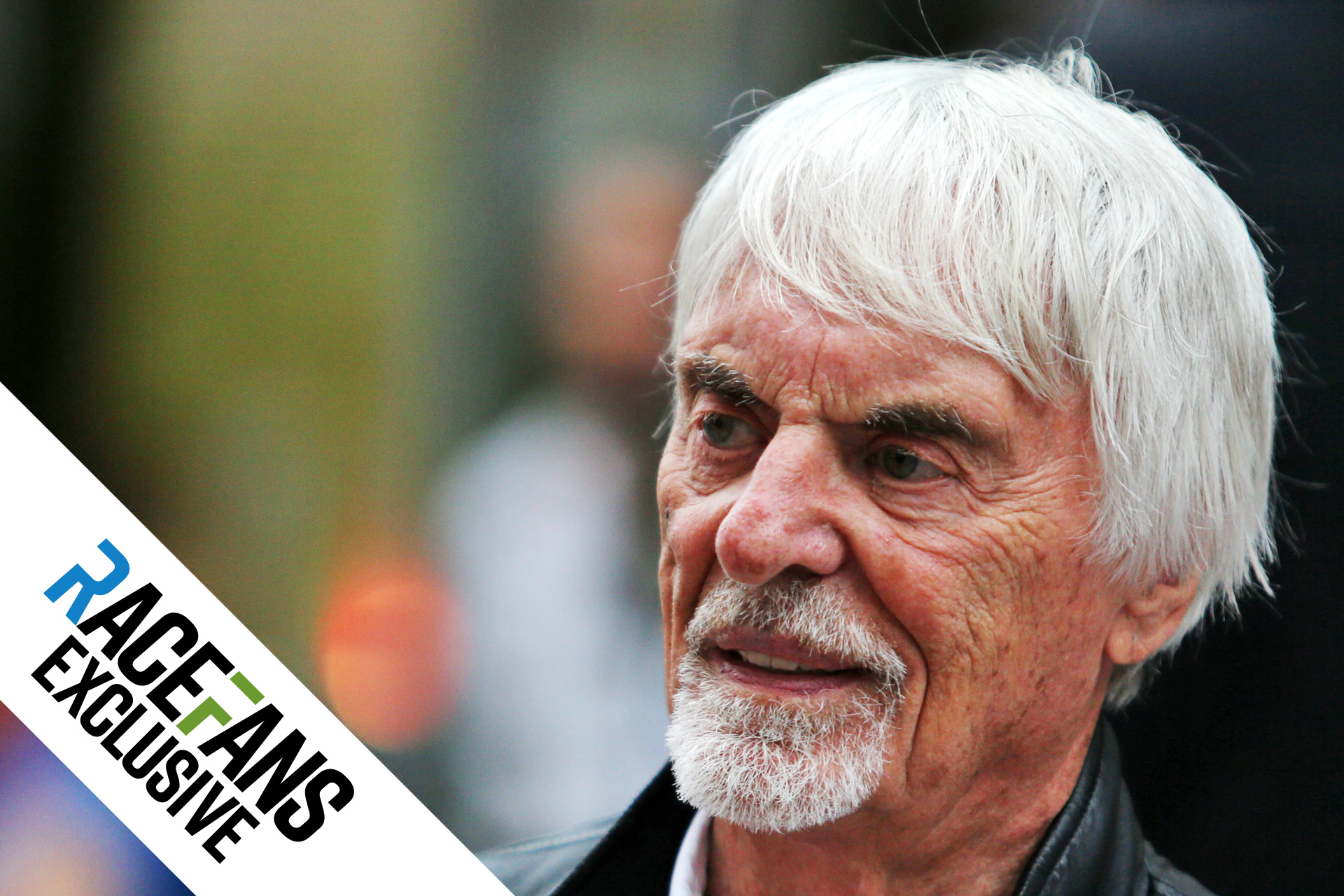The person who shaped modern Formula 1 more than any other was present at the first ever round of the world championship, decades before he turned it into the global sport it became.
Speaking exclusively to RaceFans, Bernie Ecclestone described how he slept in a car at Silverstone 70 years ago this week in order to participate in a support race at the British Grand Prix weekend.But Ecclestone admitted the wider significance of the occasion was lost on him at the time. “We wanted to race wherever we could,” he said. “We had a car we could race, so that’s it.”
Ecclestone, 19 at the time, raced a Cooper 500 that year and arranged for a van to take his car to the track that weekend for a support race. He drove there in a Ford Custom, accompanied by his father.
“We slept in the car,” he recalls. “Because in those days there were no hotels anywhere near Silverstone. And with the big crowds, which was obviously going to be we thought that’s the safest thing to do.”

While Ecclestone’s racing career failed to blossom, some of his rivals that day fared much better. Stirling Moss was among those he shared the grid with.
Eight years later, having purchased a Connaught Formula 1 car, Ecclestone attempted to qualify for the Monaco Grand Prix, but failed. Later in the year his close friend Stuart Lewis-Evans died after sustaining serious burns in a crash at the Moroccan Grand Prix.
Close personal losses such as this, and the death in 1970 of Jochen Rindt, are the moments which stand out clearest in Ecclestone’s memory from a life spent in motorsport.
Advert | Become a RaceFans supporter and
“I suppose really the things that stick in your mind were the things that shouldn’t,” he said. “I mean, when Jochen got killed at Monza, that sort of thing. And in Casablanca, with Lewis-Evans, things like that.

They also prompted him to reconsider his future in the sport, Ecclestone added. “When Stewart and Jochen [died], I sort of stepped back a bit. But that was it. Step back and then had a rethink and started to get involved again.”
Following Rindt’s death, Ecclestone took over the Brabham team, and by the eighties was winning world championships with Nelson Piquet. But despite the success he enjoyed with the likes of Piquet, Niki Lauda and Carlos Reutemann, Ecclestone himself never appeared on an F1 podium.
“I enjoyed being a part of every race,” he said. “The race itself, I used to disappear more or less halfway through, or when I thought there was nothing else I could do. I was more interested in making the things happen and building up to what we got now rather than the race itself.
Advert | Become a RaceFans supporter and
“I remember once in Watkins Glen we were first and second and we had a customer car that was third. And then I left, sort of two-thirds of the race gone I left. Didn’t even know we were with first and second, we were first and second time at the time in the race but I still left.”

By the time Piquet was winning championships, Ecclestone was already heavily involved with taking over the commercial side of the sport and doing deals with new race venues, which he says brought him even greater pleasure than his or his team’s performances on the track.
“It wasn’t really sort of part of my life, the racing part. When I got involved with doing the other things, that was more satisfying for me.
“Finding the new countries that never thought they should have a race or needed a race and eventually making sure they did ever race and it was successful. That, to me, is more satisfying than being in a race car and winning a race.
“It was nice to win the world championship, obviously. But it is one of those things – that’s what you’re supposed to be doing…”
F1 history
- How you rated F1’s 12 sprint races so far – and why two outscored the grand prix
- Alonso set to become F1’s oldest driver for more than 50 years
- From ‘Flying Pig’ to Senna’s heroics: The short, incredible history of Toleman
- From farcical to fantastic: Formula 1’s 14 title-deciding Japanese races ranked
- Benched: The five other drivers who stood down for team mates in last 50 years





Aldoid
16th May 2020, 10:37
Love him or loathe him, his contributions to the sport have been undeniably significant. Bernie’s led quite a life.
Sensord4notbeingafanboi (@peartree)
16th May 2020, 14:32
Why would anyone loathe Bernie? It is a phrase often associated with Ecclestone. Never really thought about until now.
Aldoid
17th May 2020, 3:21
Really? I’ve had the misfortune of meeting several people who harbor an intense & irrational dislike of rich people in general. Not to mention the fact that Bernie has been known to make inflammatory comments all the time & isn’t known for being charitable. It’s easy for me to imagine a healthy number of people who dislike him.
Mr. Ecclestone
19th May 2020, 14:34
ive heard that bernie is charitable, i think. he doesn’t impress me as somebody that would announce his charity though. charity comes in many forms too. 2020 is really clown world because im here defending bernie lol
anon
17th May 2020, 10:22
@peartree for a start, as Aldoid notes, Bernie has made some extremely inflammatory remarks that have drawn significant criticism – in particular, he made a series of comments which were heavily criticised for promoting anti-Semitic tropes.
bernasaurus (@bernasaurus)
16th May 2020, 11:14
I do wonder how history will remember him…………. It could go either way.
Jose Lopes da Silva
16th May 2020, 13:52
History does not ‘remember’ people or facts. There are always different interpretations of the same facts. It depends on each historian and on each person.
I regret that Ecclestone, while creating the sport we all love in a way we could actually follow it, ended up selling it in 1998, with the consequences we’re facing today.
Dieter Rencken (@dieterrencken)
16th May 2020, 16:54
He didn’t sell it in 1998, he bought it. He sold 50% in 1999/2000 and another 25% in 2001. Thereafter he sold small chunks until Liberty acquired the shares, when he cashed out after the ‘tag-along’ rights expired.
The guys to ‘blame’ for the initial sale are the FIA blazers who approved the 113-year sale at $313m in the first place. He could only buy what was offered at the price agreed.
Fast
16th May 2020, 20:43
@dieterrencken – in ’98 did the EU pressure the FIA to sell the commercial rights?
My Left Eye (@blik)
16th May 2020, 12:08
Bernie has done more for F1 than anyone that might comment on the article.
Drop Sochi
16th May 2020, 14:26
Some say he tried qualifying a car at Monaco so he could sell the car with some racing pedigree rather than vanilla. Maybe it worked, I don’t doubt it.
anon
16th May 2020, 22:09
The idea of “selling the car with some racing pedigree” sounds questionable to me, as the car in question – the Connaught Type C – was an updated version of a Type B chassis that had been used before and so already had some racing pedigree.
I think the chassis Bernie is listed as driving is chassis B3, which was one of the two cars he bought (B7 being the other chassis) – chassis B3 is listed as having taken fourth place in the 1957 Monaco Grand Prix, so that car already had some racing pedigree. It also doesn’t make sense given that Ecclestone’s drivers had already attempted to qualify the car before Ecclestone set his own laps, and the same car would subsequently be used in the 1958 British Grand Prix as well.
The explanation that has more normally been given is that Bernie was driving the car in order for his team to qualify for starting money from the organisers (I believe it basically came down to doing a certain number of laps in the practise sessions).
Drop Sochi
17th May 2020, 13:49
Thanks for the correction!
alex from tucson
16th May 2020, 19:43
Great quote to end the article with. I appreciate seeing this side of Ecclestone— I was born in the 90s and never witnessed his team management days.
Jason (@jmwalley)
22nd May 2020, 14:12
Eccelstone’s is a biography I would love to read. But, seriously, I would expect it to be massive. I perceive there to be so much rich content around his life in F1.
I loved to hate on his actions when he was in charge, but I realize now that a lot of that may have been posturing or using the media headlines to get leverage he wanted in one way or another. I DO think he was good for the sport, and would have loved the opportunity to work for/with him in creating the empire F1 is today.